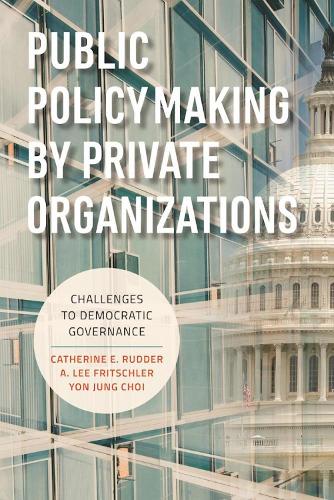
Public Policymaking by Private Organizations: Challenges to Democratic Governance
(Paperback)
Publishing Details
Public Policymaking by Private Organizations: Challenges to Democratic Governance
By (Author) Catherine E. Rudder
By (author) A. Lee Fritschler
By (author) Yon Jung Choi
Bloomsbury Publishing PLC
Brookings Institution
28th July 2016
United States
Classifications
Professional and Scholarly
Non Fiction
Politics and government
Political activism / Political engagement
320.6
Physical Properties
Paperback
224
Width 151mm, Height 227mm, Spine 15mm
349g
Description
"How private groups increasingly set public policy and regulate liveswith little public knowledge or attention.
From accrediting doctors and lawyers to setting industry and professional standards, private groups establish many of the public policies in todays advanced societies. Yet this important role of nongovernmental groups is largely ignored by those who study, teach, or report on public policy issues. Public Policymaking by Private Organizations sheds light on policymaking by private groups, which are not accountable to the general public or, often, even to governments.
This book brings to life the hidden world of policymaking by providing an overview of this phenomenon and in-depth case studies in the areas of finance, food safety, and certain professions. Far from being merely self regulation or self-governance, policymaking by private groups, for good or ill, can have a substantial impact on the broader publicfrom ensuring the safety of our home electrical appliances to vetting the credit-worthiness of complex financial instruments in the run-up to the 2008 financial crisis.
From nonprofit associations to multinational corporations, private policymaking groups are everywhere. They certify professionals as competent, establish industry regulations, and set technical and professional standards. But because their operations lack the transparency and accountability required of governmental bodies, these organizations comprise a policymaking territory that is largely unseen, unreported, uncharted, and not easily reconciled with democratic principles. Anyone concerned about how policies are madeand who makes themshould read this book."
Reviews
Rudder, Fritschler and Choi raise the curtain on a 5th estate in public policy making. The leverage of private organizations making public policy is an issue about which all should be aware; students and practitioners should recognize this increasingly central aspect of how public policy is made, including for higher education.Richard Legon is the President of the Association of Governing Boards of Universities and Colleges
The book, Public Policy Making by Private Organizations by Rudder, Fritschler, and Choi, is a path-breaking work in public policy study. This book opens up a new field of public policy studies by bringing scholarly attention to the heretofore overlooked arena of private governance of public affairs; namely rules and policies that financial institutions, professional and educational organizations and commercial business groups adopt for their operations tending to have effects on general public and constituent population just as ordinary public policies affecting the target population. "A private governance of public policy" clearly extends studies of public policy making beyond the traditional boundaries and enriches public policy making studies in the United States. Serious students of public policy would now find a vast new opportunity for original research and discoveries.Yong Hyo Cho, Professor Emeritus of the University of Akron and San Francisco State University
Public Policymaking by Private Organizations will surprise readers as it reveals the astounding range of non-governmental regulatory and policymaking organizations that impact virtually every aspect of our homes and work places. The authors have succeeded in producing a book that, while very readable, provides an enormous amount of information about these organizations that are rarely given any attention in our classrooms.Dwight Ink, former president of the Institute of Public Administration and senior federal executive serving seven presidents
A significant contribution to the field because it brings into focus a little understood aspect of the very complex world of governancethe role of private organizations.Charles F. Bingman, Fellow, Center for the Study of American Government, Johns Hopkins UniversityAuthor Bio
"
Darrell M. West is vice president of the Governance Studies program at the Brookings Institution. He is the author of Megachange: Economic Disruption, Political Upheaval, and Social Strife in the 21st Century and Billionaires: Reflections on the Upper Crust.
Catherine E. Rudder, professor emerita, joined George Mason Universitys School of Policy, Government, and International Affairs after having served as executive director of the American Political Science Association for fourteen years. She is coauthor, with A. Lee Fritschler, of Smoking and Politics: Bureaucracy Centered Policymaking, sixth edition.A. Lee Fritschler is professor emeritus in the School of Policy, Government, and International Affairs at George Mason University. He specializes in regulatory and higher education policy. He was assistant secretary of Education, U.S. Department of Education, president of Dickinson College, chair of the U.S. Postal Regulatory Commission, and vice president of Brookings. Fritschler is coauthor, with Catherine E. Rudder, of Smoking and Politics: Bureaucracy Centered Policymaking, sixth edition.
Yon Jung Choi is a Ph.D. candidate and holds a masters degree in public policy from the School of Policy, Government, and International Affairs at George Mason University, focusing on her research on corporate social responsibility (CSR) and global governance."
